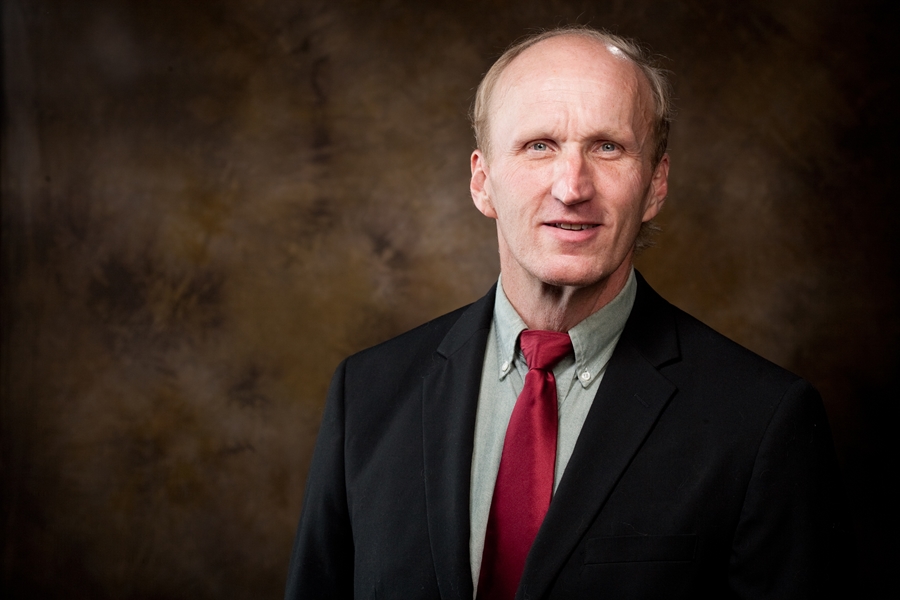FAYETTEVILLE, Ark. – James Lampinen, distinguished professor of psychological science at the University of Arkansas, is partnering on a project with the Arkansas Association of Chiefs of Police to adopt a science-based model policy for Arkansas law enforcement officers to use that will reduce errors when collecting and evaluating eyewitness identification information.
The association’s goal is for all Arkansas police departments and law enforcement agencies to adopt and use this model policy. Lampinen has provided feedback on the policy and is helping to promote it with law enforcement agencies around the state. He will also help train officers in how to effectively use the method.
"It’s critical for law enforcement to follow science-based practices when collecting eyewitness evidence,” said Lampinen. “I'm proud to be working with the Arkansas Association of Chiefs of Police in developing and promoting sound eyewitness identification procedures."
Hope Police Chief J.R. Wilson, president of the Arkansas Association of Chiefs of Police, said the model policy will make a difference for investigators and for the public.
“Merely following the science-based suggested practices will reduce incorrect identification and the tragedy of wrongful conviction and incarceration,” Wilson said.
Lampinen is author of the 2012 book The Psychology of Eyewitness Identification. He is a certified law enforcement trainer in Arkansas and has worked around the state to provide expert training on eyewitness identification to law enforcement, the Arkansas Bar Association, and the Oklahoma Bar Association. Chief Wilson says Lampinen will play a vital role in the success of the new procedure.
“The science behind eyewitness testimony is clear and convincing,” said Wilson. “Our challenge now is to get Arkansas law enforcement agencies to implement these policies and commit to the practice. Dr. Lampinen will work with us to help explain the science, answer any questions, and train law enforcement officers around our state. Successful law enforcement requires community partnerships and we are honored to partner with Dr. Lampinen in this endeavor.”
The science-based protocols are supported by the National Academy of Sciences, National Institute of Justice, American Psychological Association, American Bar Association, the International Association of Chiefs of Police and others. Approximately 30 years of scientific research prove the benefits of these protocols.
The Arkansas Association of Chiefs of Police has also partnered with the Innocence Project and other organizations in this effort. Members of the association leadership recently attended the first National Eyewitness ID Symposium held by the Justice Education Center at Yale Law School to better familiarize themselves with the science behind the protocols.
About the Arkansas Association of Chiefs of Police: The AACP is a non-profit organization of police chiefs and executives from the state of Arkansas who recognize the importance of having proven, effective leaders in law enforcement. The AACP continually works towards enhancing the knowledge and skills of police executives so they can effectively meet the growing demand of providing the best possible law enforcement available today. Find out more at www.arkchiefs.org.
About the University of Arkansas: The University of Arkansas provides an internationally competitive education for undergraduate and graduate students in more than 200 academic programs. The university contributes new knowledge, economic development, basic and applied research, and creative activity while also providing service to academic and professional disciplines. The Carnegie Foundation classifies the University of Arkansas among only 2 percent of universities in America that have the highest level of research activity. U.S. News & World Report ranks the University of Arkansas among its top American public research universities. Founded in 1871, the University of Arkansas comprises 10 colleges and schools and maintains a low student-to-faculty ratio that promotes personal attention and close mentoring.
Topics
Contacts
Laneigh Pfalser, communications director
Arkansas Association of Chiefs of Police
501-372-4600,
Steve Voorhies, manager of media relations
University Relations
479-575-3583,
